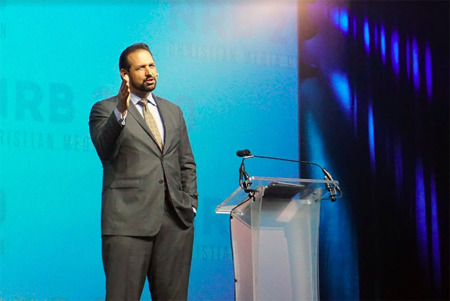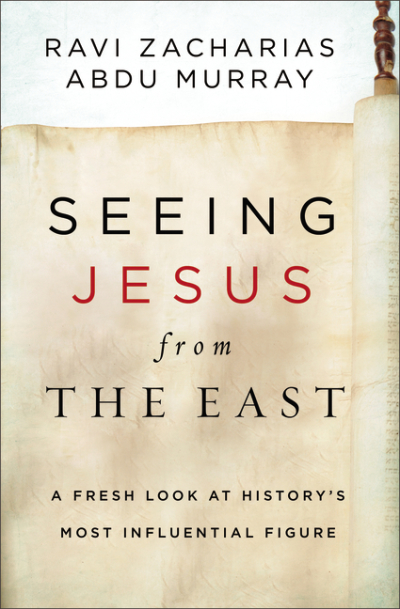Former 'apologist for Islam': Seeing Jesus through Eastern eyes 'critical' to evangelizing Muslims

Seeing Jesus through Eastern eyes and understanding the person and significance of the Son of God within His own cultural context is “critical” to reaching Muslims with the Gospel, a former self-described “apologist for Islam" advises Christians in the West.
“People in the West have historically tended to think of Jesus as the icon of Western imperialistic religion,” author and Christian apologist Abdu Murray told The Christian Post. “Sadly, Easterners also have come to think of Jesus that way. They associate Christianity or Jesus with colonialism and imperialism.
“If Westerners understand the Eastern Jesus, then they can show Jesus who was actually authentic, who speaks the language, who understands the issues, who understands the cultural phenomenon that Easterners deal with, whether they're Muslims, Hindus or otherwise,” he said.
“The Westerner can then say, ‘The Jesus I’m offering you is the Jesus who looks just like you, who acts just like you, who understands the things that you go through.’ That Jesus becomes much more attractive. He's not a Western export to the East; rather, He's an Eastern import. Offering Jesus to the Easterner in an authentic way that relates to them isn’t just helpful when presenting the Gospel, it’s absolutely critical.”
As the senior vice president of Ravi Zacharias International Ministries, Murray knows a great deal about reaching Muslims with the truth of the Gospel. For most of his life, the former lawyer was an “apologist for Islam,” he told CP, describing himself as a “proud Muslim who believed Islam was the only way.”
After a nine-year investigation into the historical, philosophical, and scientific underpinnings of the major world religions and views, Murray came to the realization that “the God of Christianity was greatest possible being.”
“Then,” he said, “my searching culminated, and I realized that the one I was searching for all along was the God of the Bible.”
In collaboration with Zacharias, who has authored or edited over 25 books in the fields of theology, apologetics, comparative religion, and philosophy, Murray is releasing a book titled, Seeing Jesus From the East: A Fresh Look at History's Most Influential Figure.
The purpose of the book, Murray said, is twofold: “One, we wanted to recapture the sense of Jesus' fundamental Eastern-ness and how He speaks to both Easterner and Westerner alike,” he said. “We want the Easterner to see Jesus as someone they can identify with, and the Westerner to see that it isn’t the West that influenced Christianity. Two, we wanted to demonstrate how Christianity changed the West forever by introducing ideas, essential works, and dignity of all human beings. These changed the trajectory of history.”
The idea for Seeing Jesus from the East was originally pitched to Zacharias by Muslim-turned-Christian apologist Nabeel Qureshi, who died from stomach cancer in 2017 before the book could come to fruition.
Zacharias later called Murray and asked him to “take up the mantle,” he said, “because of my background as a former Muslim and someone with a Middle Eastern heritage.”

“I was honored to do so,” he said, adding that the book is dedicated to Qureshi.
In their book, Zacharias and Murray identify key cultural insights about Jesus that readers often miss when the Eastern context of the Bible is ignored.
One key difference between the East and the West, Murray told CP, is the “shame and honor” culture of the former versus the “guilty or innocent” culture of the latter.
“Honor-shame culture says that what you believe isn't just a matter of a personal choice; it actually affects the way other people live their lives,” he explained. “This creates a barrier to belief, because even if one sees the truth of the Gospel, they may not want to embrace the Gospel because they are terrified of how they will be viewed by their family and community.”
“In some parts of the East, you run the risk of your life when you change your worldview,” he stressed. “Honor-shame cultures do care about the truth, but they also care deeply about how they are perceived. If you are perceived with honor, you will be honored. If you're perceived with shame, it’s a very serious issue.”
The Bible, Murray said, was written and primarily transmitted to and through an honor-shame culture. Throughout His earthly ministry, Jesus challenged this reality, emphasizing that true honor is bestowed by God — not human beings.
“Every time Jesus sees someone who is culturally shamed, He liberates them from that shame,” Murray said. “What is so beautiful for people in an honor-shame context is that, while they might suffer the cultural and social shames of coming to faith in Christ, Jesus replaces the temporal honors that we get in our culture with the Heavenly eternal honor of being included in the Kingdom of God. That makes Jesus incredibly attractive.”
Eastern cultures are also communal, while Western cultures are individualistic, the author said, adding, “Jesus sometimes interacts with people in ways that we find puzzling in the West because we don't understand the paradigms in which Jesus lived.”
“What was remarkable about Jesus is that though He valued tradition and the collective, He never did so at the expense of individual dignity,” he said. “When a person's individual dignity was being trampled upon by the collective, His radar went up. He wanted to make sure that the individual knew that he or she was valuable in God's eyes, even if the collective didn't think so. And so He honored the collective, but He also honored the individual.”
In a society where Christianity is often characterized as a Western religious tool used to oppress and suppress Easterners, it’s important for Christians to care about how those in the East see Jesus and hear His Gospel, Murray said.
Every page of the Bible “drips with olive oil,” he said. “Jesus’ phrases and the things He does smell of the cumin and the curries of the East.”
“We hope Eastern readers will see and be able to identify with Jesus within their own context and see how He identifies with their struggles and their hopes,” Murray said. “For the Westerner, we would love them to see that there's a depth and a richness to Jesus when we understand His Eastern-ness that we might have otherwise missed if we just kept Him in the western box we've created for Him.”
“If we just allow ourselves to see Jesus through Eastern eyes, we’ll see Him in a vibrant, new way.”





















